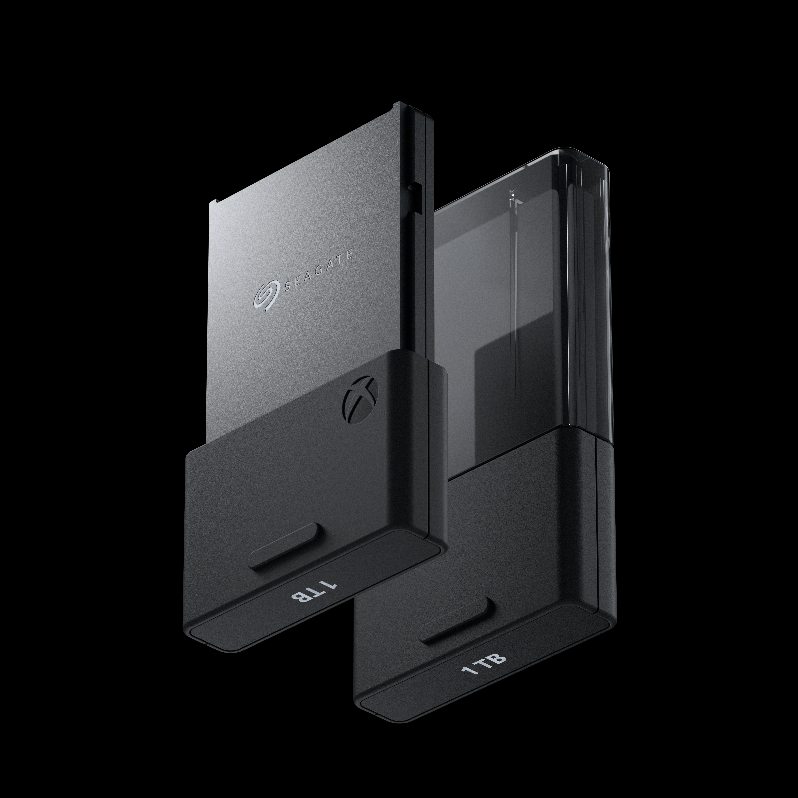Xbox Series X Will Use Proprietary External SSDs For Expansion
Conveniently runs external games...at a cost
The Xbox Series X announced its hardware specs earlier today, which included an upgrade from the Xbox One’s internal HDD to a new internal SSD, along with the option to add external SSDs on top of that for extra storage, portability, and even performance. However, to do that, you'll need to buy a special proprietary 1TB SSD. Otherwise, the only other external storage available will be USB hard drives for games from previous generations, and even then, you might lose performance.
One of the major selling points Microsoft focused on in its specs reveal was increased performance for not just new games, but also Xbox One, Xbox 360, and even original Xbox games running on the Xbox Series X. To that end, the console is introducing SSDs to replace the slower hard drives that the Xbox line has been using up until now.
At launch, the Xbox Series X will have a 1TB internal NVMe SSD, which Microsoft promises will allow gamers to suspend multiple games at once, as well as experience faster loading times in both new releases and older games like Assassin’s Creed Odyssey and Final Fantasy XV. This will supposedly be due to the Xbox Velocity Architecture, a new proprietary system for developers that Microsoft says will allow “100GB of game assets to be instantly accessible by the developer.”

This is where the external SSD comes into play. Built exclusively by Seagate and offering the same specs as the internal drive, this expansion card looks roughly like an update on old-school PS2 or original Xbox memory cards, and uses a proprietary connector.
The uses for this proprietary Seagate SSD are three-fold. The first, obviously, is to expand storage space on your console should your game library ever outgrow 1TB, which is more likely as increased complexity makes games larger. Second, it allows users to easily bring games across consoles, since cards will be swappable between systems. Finally, and perhaps most importantly, is that it allows any externally stored Xbox Series X optimized games, even older generation ones like Gears of War 5, to take advantage of the Xbox Velocity architecture- something they won't be able to do with an external USB drive.
Get Tom's Hardware's best news and in-depth reviews, straight to your inbox.
“Previous generation Xbox titles can still be played directly from external USB 3.2 hard drives,” Microsoft promises in its announcement. “However, to receive all the benefits of the Xbox Velocity Architecture and optimal performance, Xbox Series X optimized games should be played from the internal SSD or Xbox Series X Storage Expansion Card.”
All of this comes at a price, though. While older generation games can be played off USB hard drives (if you're willing to lose performance on the Xbox Series X optimized ones), newer games will expect to be run off an SSD. And as of now, Seagate's proprietary drive is the only external SSD available and is likely to cost more because of it.
This means that owners won’t be able to expand their console’s storage for new games as easily as a Switch owner might, by simply swapping out microSD cards. Instead, they’ll have to buy Seagate's custom NVMe SSD, even if they don’t need a full terabyte of external storage. And with Seagate already selling 1TB PC NVMe SSDs for $199.99 and Xbox One USB SSDs for $214.99, that will likely be quite an investment.
With the Nintendo Switch running its games off of cartridges and now Xbox following suit with external SSDs, video games are making a clear shift towards storage mediums with faster loading times. An external SSD is a logical next step, but the cost associated with locking players down to one option as opposed to letting them use any external SSDs they already own might not justify the convenience of the plug-and-play slot.
We're curious if the internal SSD could be modded out, and if this move might encourage tech-savvy owners to opt for that instead.
Michelle Ehrhardt is an editor at Tom's Hardware. She's been following tech since her family got a Gateway running Windows 95, and is now on her third custom-built system. Her work has been published in publications like Paste, The Atlantic, and Kill Screen, just to name a few. She also holds a master's degree in game design from NYU.
-
richiestang_78 Wanna bet it will have firmware/software locks to prevent people from making converters in order to sue standard non overpriced SATA/USB SSDs.Reply -
Chung Leong Even 2TB is not a lot given the number of games people may have using Game Pass. A speculation of mine is that the XSX will come with a large spinning hard-drive so games can be swapped out from the SSD.Reply -
cryoburner Reply
It's possible they could lock it down, but the drives are just likely standard NVMe drives in a plastic cartridge, and my suspicions are that standard NVMe drives will work with an adapter. After all, if they really wanted to lock storage down to proprietary options, they could have already been doing that with external hard drives.richiestang_78 said:Wanna bet it will have firmware/software locks to prevent people from making converters in order to sue standard non overpriced SATA/USB SSDs.
Most people using the game pass are likely to have fast connections that they can re-download games on in a reasonable amount of time, so that's probably not too much of a problem. It sounds like new games designed for the consoles will be expected to run from fast NVMe storage, so you won't be running them directly from a hard drive. And of course, external USB drives can still be used for older games and such, and it might even be possible to backup new games to external hard drive storage, so I have doubts that they would bother to include an internal mechanical drive. As the cost of SSDs come down, they will likely launch revisions of the system with more NVMe storage capacity, as well as higher-capacity expansion NVMe drives for existing systems.Chung Leong said:Even 2TB is not a lot given the number of games people may have using Game Pass. A speculation of mine is that the XSX will come with a large spinning hard-drive so games can be swapped out from the SSD. -
mdd1963 Can console gamers use normal PC keyboards and mice for controls?Reply
(Serious question, I've always rolled my eyes at consoles, but, one serious complaint is I find the mouse and keyboard FAR superior for a skilled gamer) -
drivinfast247 Reply
Some games support k/m on Xbone 1Xmdd1963 said:Can console gamers use normal PC keyboards and mice for controls?
(Serious question, I've always rolled my eyes at consoles, but, one serious complaint is I find the mouse and keyboard FAR superior for a skilled gamer) -
watzupken I actually don't understand why it is so difficult for Microsoft to make a storage upgrade easy. Sony allowed easy upgrade of PS hard disks for some number of years now, and I don't see much negatives. If they want Game Pass to have better chance, they should allow for easy upgrade to a higher capacity SSD since the games are ridiculous when it comes to storage requirements.Reply -
King_V Because "Velocity"?Reply
Is that REALLY going to offer any kind of magical performance benefit that a normal external USB SSD couldn't achieve?
C'mon, Microsoft - don't go down this route of trying to profit off of proprietary hardware. It can't end well. Didn't really work with the whole "IE is an integral part of Win98" fiction back in the day, either, in case an object lesson is needed. -
alextheblue Reply
I mean, yes and no. I don't think I'd want a USB SSD when a PCIe 4.0 option is available (which is almost certainly what they're using). As for it being proprietary, only time will tell if there end up being additional third party options and/or adapters for M.2 drives. I would bet we'll see options from a couple others, at least, and prices will come down over time and capacities will go up. No matter what you use, it will have to hit certain min performance targets or it could affect the gaming experience, since devs will build their streaming around the internal drive.King_V said:Is that REALLY going to offer any kind of magical performance benefit that a normal external USB SSD couldn't achieve?
We don't know for sure how many lanes it will use, either. It would really throw a wrench in the idea of an M.2 adapter if they were using a custom 6-lane drive. Like, maybe you could do it... but it wouldn't be able to hit the same speeds. It's an interesting thought, at any rate - but they probably use 4 lanes. -
Chung Leong Replycryoburner said:Most people using the game pass are likely to have fast connections that they can re-download games on in a reasonable amount of time, so that's probably not too much of a problem.
Most ISPs impose data cap though. With games around 100GB you can pretty easily hit a 1TB cap. And reloading from HDD cold storage is a better experience. A game that you rarely play (which got swapped out as a result) is probably not one you want to wait for. It might be something that you'd you have friends around. Even three, four minutes would feel agonizingly long. -
Rdslw Reply
best way for them is to allow BOTH but lock something out of not-ours. so yes it will propably work but as they mentioned non-usb gains, I think they will apply here also.cryoburner said:It's possible they could lock it down, but the drives are just likely standard NVMe drives in a plastic cartridge, and my suspicions are that standard NVMe drives will work with an adapter. After all, if they really wanted to lock storage down to proprietary options, they could have already been doing that with external hard drives.
and its microsoft. they will charge 50% margin over their own margin.
